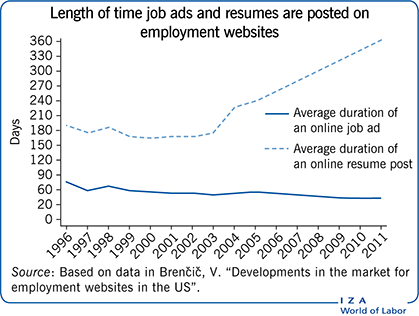Elevator pitch
Employers are steadily increasing their reliance on technology when recruiting. On the one hand, this technology enables the wide dissemination of information and the management of large quantities of data at a relatively low cost. On the other hand, it introduces new costs and risks. The ease with which information can be shared, for example, can lead to its unauthorized use and obsolescence. Recruiting technologies are also susceptible to misuse and to biases built into their underlying algorithms. Better understanding of these trade-offs can inform government policies aiming to reduce search frictions in the labor market.

Key findings
Pros
Online job boards have improved the ease with which information about available job opportunities can be shared and updated.
Online platforms for contract labor enable employers to hire from a larger and more diverse pool of applicants.
Better information about job searchers has tilted employers’ hiring in favor of disadvantaged job searchers and increased the number and quality of matches, especially for technical jobs.
Better information about employers has increased the quality of matches as evidenced by lower turnover.
Cons
The ease of information sharing on websites that host job boards and resume banks can lead to stale information about jobs and resumes.
Employers can use social networking sites to get information about workers without the workers’ knowledge.
The use of technology might not improve hiring and can lead to shorter tenure of new hires.
Exclusive reliance on technology to analyze data can result in inefficient hiring because of biases and manipulation.